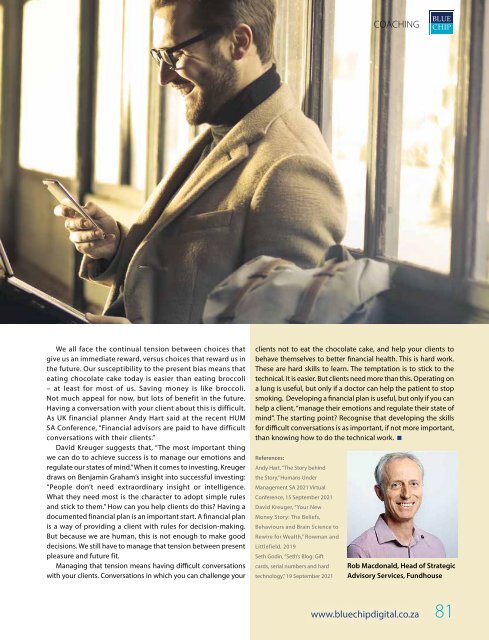Blue Chip Issue 81
Blue Chip is a quarterly journal for the financial planning industry and is the official publication of the Financial Planning Institute of Southern Africa NPC (FPI), effective from the January 2020 edition. Blue Chip publishes contributions from FPI and other leading industry figures, covering all aspects of the financial planning industry. Blue Chip takes this opportunity to wish the FPI a happy 40th anniversary. Congratulations!
Blue Chip is a quarterly journal for the financial planning industry and is the official publication of the Financial Planning Institute of Southern Africa NPC (FPI), effective from the January 2020 edition. Blue Chip publishes contributions from FPI and other leading industry figures, covering all aspects of the financial planning industry.
Blue Chip takes this opportunity to wish the FPI a happy 40th anniversary.
Congratulations!
You also want an ePaper? Increase the reach of your titles
YUMPU automatically turns print PDFs into web optimized ePapers that Google loves.
COACHING<br />
We all face the continual tension between choices that<br />
give us an immediate reward, versus choices that reward us in<br />
the future. Our susceptibility to the present bias means that<br />
eating chocolate cake today is easier than eating broccoli<br />
– at least for most of us. Saving money is like broccoli.<br />
Not much appeal for now, but lots of benefit in the future.<br />
Having a conversation with your client about this is difficult.<br />
As UK financial planner Andy Hart said at the recent HUM<br />
SA Conference, “Financial advisors are paid to have difficult<br />
conversations with their clients.”<br />
David Kreuger suggests that, “The most important thing<br />
we can do to achieve success is to manage our emotions and<br />
regulate our states of mind.” When it comes to investing, Kreuger<br />
draws on Benjamin Graham’s insight into successful investing:<br />
“People don’t need extraordinary insight or intelligence.<br />
What they need most is the character to adopt simple rules<br />
and stick to them.” How can you help clients do this? Having a<br />
documented financial plan is an important start. A financial plan<br />
is a way of providing a client with rules for decision-making.<br />
But because we are human, this is not enough to make good<br />
decisions. We still have to manage that tension between present<br />
pleasure and future fit.<br />
Managing that tension means having difficult conversations<br />
with your clients. Conversations in which you can challenge your<br />
clients not to eat the chocolate cake, and help your clients to<br />
behave themselves to better financial health. This is hard work.<br />
These are hard skills to learn. The temptation is to stick to the<br />
technical. It is easier. But clients need more than this. Operating on<br />
a lung is useful, but only if a doctor can help the patient to stop<br />
smoking. Developing a financial plan is useful, but only if you can<br />
help a client, “manage their emotions and regulate their state of<br />
mind”. The starting point? Recognise that developing the skills<br />
for difficult conversations is as important, if not more important,<br />
than knowing how to do the technical work. <br />
References:<br />
Andy Hart, “The Story behind<br />
the Story,” Humans Under<br />
Management SA 2021 Virtual<br />
Conference, 15 September 2021<br />
David Kreuger, “Your New<br />
Money Story: The Beliefs,<br />
Behaviours and Brain Science to<br />
Rewire for Wealth,” Rowman and<br />
Littlefield, 2019<br />
Seth Godin, “Seth’s Blog: Gift<br />
cards, serial numbers and hard<br />
technology,” 19 September 2021<br />
Rob Macdonald, Head of Strategic<br />
Advisory Services, Fundhouse<br />
www.bluechipdigital.co.za<br />
<strong>81</strong>


















